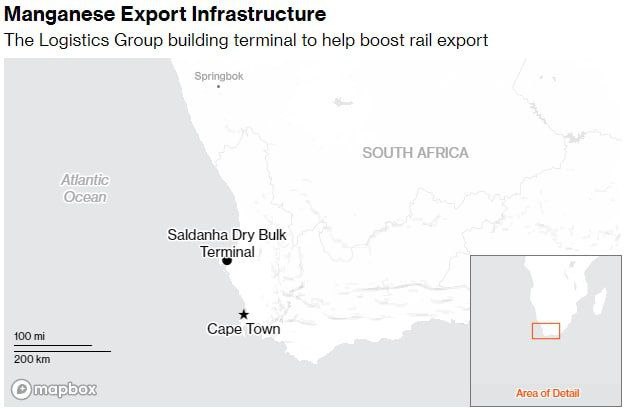The Logistics Group has built a port facility in South Africa that will enable increased volumes of a key battery metal to be offloaded from one of the world’s longest freight trains for export as the country struggles with a lack of rail capacity, according to its chief executive officer.
Volumes transported across the continent’s most industrialized nation by state-owned port and rail operator Transnet SOC Ltd. have declined over recent years due to corruption, mismanagement and a shortage of locomotives. An 861-kilometer (535-mile) line that runs from mines in Sishen to the Port of Saldanha on the west coast and is used by a 4-kilometer-long train that comprises 375 wagons has remained among the most reliable of its operations.
The Logistics Group, owned by Old Mutual Ltd.’s African Infrastructure Investment Managers, saw potential to increase efficiency by building the Saldanha Dry Bulk Terminal, a storage facility that can accept 100 tons per wagon rather than the 63 tons that existing operations in the area can process, CEO Anton Potgieter said. Before signing a single contract, the company “took a leap of faith,” acquired the land and built the 200 million rand ($11 million) project, which includes a warehouse that can accept trains, he said in an interview.
The firm’s roots go back to a co-operative owned by farmers, who used it to export their fruit. That business expanded to cement, fertilizers, containers and manganese before Logistics Group was unbundled in 2018. It then added operations in Mozambique, Namibia and Tanzania.
“We expanded the footprint quite rapidly,” Potgieter said. “With Transnet’s downward spiral there was a lot of cargo that then came available for private operators in the ports.”
Manganese is the fourth-most used metal globally by tonnage. South Africa has about 80% of estimated global reserves of the metal that’s used in steelmaking and is a key component of lithium-ion batteries.
While Transnet’s coal deliveries have fallen to their lowest level in decades, the volume of manganese increased slightly to 14.6 million tons in the 2023 financial year. The state company has requested a government bailout to fix its finances while implementing structural reforms and calling for more private investment.
The Logistics Group submitted a proposal on the Saldanha facility that was “well received” by Transnet, which will help reduce the number of trains needed on the line once the site is operational, Potgieter said.
Volumes transported across the continent’s most industrialized nation by state-owned port and rail operator Transnet SOC Ltd. have declined over recent years due to corruption, mismanagement and a shortage of locomotives. An 861-kilometer (535-mile) line that runs from mines in Sishen to the Port of Saldanha on the west coast and is used by a 4-kilometer-long train that comprises 375 wagons has remained among the most reliable of its operations.
The Logistics Group, owned by Old Mutual Ltd.’s African Infrastructure Investment Managers, saw potential to increase efficiency by building the Saldanha Dry Bulk Terminal, a storage facility that can accept 100 tons per wagon rather than the 63 tons that existing operations in the area can process, CEO Anton Potgieter said. Before signing a single contract, the company “took a leap of faith,” acquired the land and built the 200 million rand ($11 million) project, which includes a warehouse that can accept trains, he said in an interview.
The firm’s roots go back to a co-operative owned by farmers, who used it to export their fruit. That business expanded to cement, fertilizers, containers and manganese before Logistics Group was unbundled in 2018. It then added operations in Mozambique, Namibia and Tanzania.
“We expanded the footprint quite rapidly,” Potgieter said. “With Transnet’s downward spiral there was a lot of cargo that then came available for private operators in the ports.”
Manganese is the fourth-most used metal globally by tonnage. South Africa has about 80% of estimated global reserves of the metal that’s used in steelmaking and is a key component of lithium-ion batteries.
While Transnet’s coal deliveries have fallen to their lowest level in decades, the volume of manganese increased slightly to 14.6 million tons in the 2023 financial year. The state company has requested a government bailout to fix its finances while implementing structural reforms and calling for more private investment.
The Logistics Group submitted a proposal on the Saldanha facility that was “well received” by Transnet, which will help reduce the number of trains needed on the line once the site is operational, Potgieter said.
